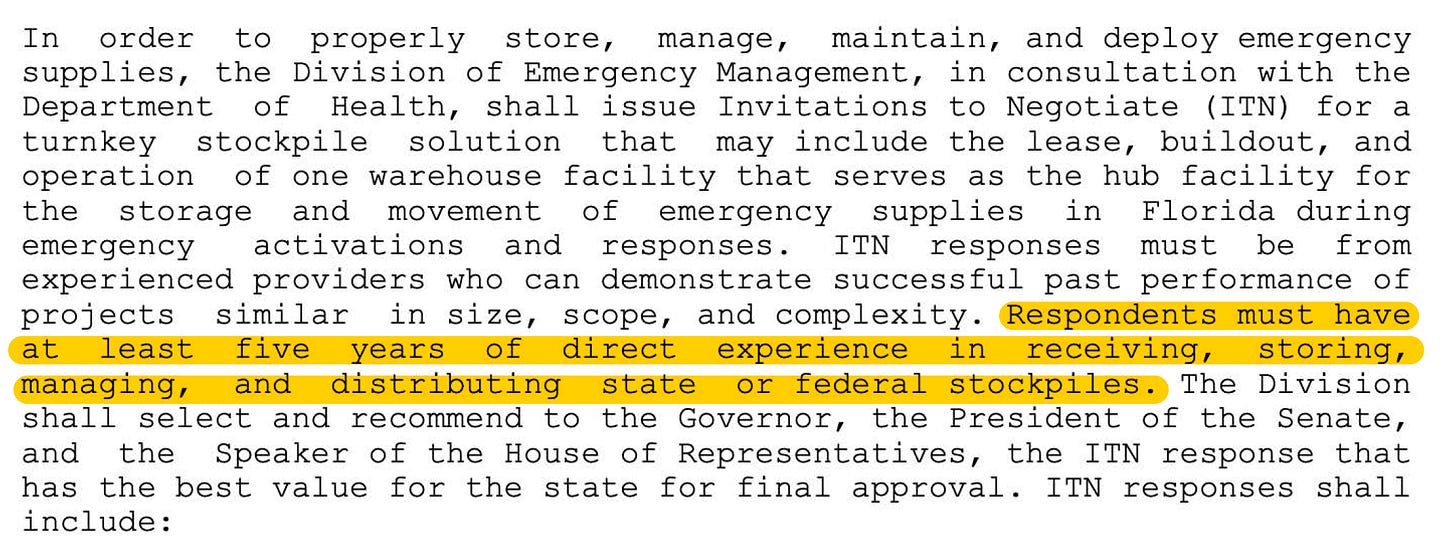A lucrative contract and lots of money for lawsuits and large landowners: A tour of Florida's proposed budget
The Florida House and Senate approved dueling $113 billion budgets this week, which they'll now negotiate into a final state spending to send to Gov. Ron DeSantis. Let's see what's inside.
The Florida House and Senate approved different $113 billion budgets this week, but both versions of the state spending plans include some interesting new instructions for the state’s Division of Emergency Management.
Tucked deep inside both documents, those instructions allow the emergency-management agency — which coordinates responses to hurricanes and other disasters — to seek out proposals for a new, state-of-the-art warehouse that would serve as central distribution hub for the state’s emergency stockpile of supplies food, bottled water, masks, gloves and generators.
This is likely to be a very expensive project: The Division of Emergency Management, known as DEM, estimates this new warehouse would cost more than $60 million to build and more than $1 million a year to operate.
And a politically plugged-in contractor is already sniffing around it: LifeScience Logistics, a Texas-based company that has become a big campaign contributor in Florida — and whose lobbyists include a pair of former aides to Gov. Ron DeSantis.
Legislative records show that at least one of LifeScience Logistics’ lobbyists has worked with lawmakers on a “DEM stockpile” provision in this year’s state budget.
And campaign-finance records show that LifeScience Logistics has donated at least $120,000 in recent weeks to key lawmakers. The company has given $50,000 each to fundraising committees controlled by Senate President Kathleen Passidomo (R-Naples) and House Speaker Paul Renner (R-Palm Coast) — plus another $10,000 each to committees controlled by Senate Budget Chair Doug Broxson (R-Pensacola) and House Budget Chair Tom Leek (R-Ormond Beach).
The procurement instructions in the House and Senate budgets don’t mention LifeScience by name. But they are carefully tailored.
Specifically, they require any vendor interested in vying for this new warehouse contract to have “at least five years of direct experience in receiving, storing, managing and distributing state or federal stockpiles.”
LifeScience Logistics has been managing emergency stockpiles for federal and state clients for 15 years, according to its website.
But do any other vendors meet this test?
That’s “unclear,” according to a spokesperson for the House of Representatives.
The DEM warehouse is but one example of the thousands of earmarks, contract carveouts and other unusual line items scattered through the House and Senate budgets, both of which were approved unanimously this week.
The House budget totals just under $113 billion. The Senate’s version is nearly $113.7 billion. The two chambers will spend the next three weeks negotiating a unified spending plan, which they’ll then send to Gov. Ron DeSantis.
But in the meantime, here’s a look at some other items that stand out in the proposed spending plans.
Fighting culture wars is expensive
The Miami Herald reported earlier this year Florida taxpayers have spent nearly $17 million on attorneys and legal fees stemming from lawsuits challenging Gov. Ron DeSantis’ various culture-war campaigns.
Taxpayers are about to spend millions more.
The House, for instance, wants to give the Governor’s Office another $4 million to spend on litigation during the 2023-24 fiscal year, which starts July 1.
It also wants to give $5 million to Attorney General Ashley Moody to spend on “litigation of Covid-19 vaccines.” (Recall that DeSantis recently had a grand jury impaneled to, among other things, investigate the drug companies that make Covid-19 vaccines.)
And if that weren’t enough, the House also wants to give another $1.3 million for litigation expenses to DeSantis’ Department of State — the agency that will likely end up defending another controversial election-law rewrite that is suddenly being rushed the Legislature in the latter half of the session.
The Senate, meanwhile, wants to give the Department of State even more money to spend on lawsuits: $3 million, plus any more money left over from another $1 million the agency got last year.
And the Senate also wants to give $2 million for litigation expenses to the Board of Governors.
That’s the DeSantis-appointed agency that oversees Florida’s public universities. And it’s almost certainly in anticipation of lawsuits stemming from DeSantis-backed bills (House Bill 999 and Senate Bill 266) that would give the governor and his political appointees more control over who universities hire and what universities teach.
Buttressing conservative beachheads
Speaking of universities, there are two key beachheads in the DeSantis’ administration’s quest to inject more conservative ideology into college campuses: New College of Florida, the small liberal-arts college in Sarasota that DeSantis wants to make “a little Hillsdale,” and the Hamilton Center at the University of Florida, a kind of college-within-a-college with a murky origin story.
DeSantis has ordered the Florida Legislature to shower both institutions in cash. And lawmakers look happy to oblige.
For instance, both the House and Senate boost operational funding for New College by nearly 60 percent — from about $27.4 million to $42.7 million.
More importantly, that increase includes $10 million a year in what’s known as “recurring funding” — a permanent budget bump that New College would get year-after-year — that DeSantis’ hand-picked college leaders will be free to spend however they want.
At the same time, the House also wants to give $10 million in recurring money to the Hamilton Center for operations — plus another $20 million in one-time money to renovate a 90-year-old building on the UF campus that will become the center’s permanent home.
The Senate has recommended $5 million a year for operations at the Hamilton Center – but $40 million for the building renovation.
Planning ahead pays off
In early 2015, back when I was at Florida Trend magazine, I wrote a story about how business leaders in Jacksonville were already working on a campaign to get one of their own chosen as speaker of the House for a term that was still nearly a decade away.
Most of the House members who would decide that race hadn’t even been elected to office yet. But one had: Rep. Paul Renner, a “redshirt” who was elected early in a mid-cycle special election. And Renner was about to be joined by a bunch of freshman members from the Jacksonville area who could potentially give him a powerful voting bloc in the speaker’s race.
Jacksonville leaders were particularly excited about what a local House speaker could do for a pair of longstanding regional priorities: Downtown redevelopment and port expansion.
Well, Renner won that speaker’s race. And he just rolled out his first proposed budget as speaker.
Two of the biggest earmarks? $50 million for a University of Florida campus in downtown Jacksonvilleand $7.5 million to replace ship-to-shore cranes at JaxPort.
Now, the Senate has only set aside $5 million and $500,000 for the those two projects.
But that’s only because every good budget writer knows a bargaining chip when they one.
From a vendor, for a vendor
Speaking of ports (and lazy transitions), the Florida Senate has an earmark in its budget that would give $250,000 to an unidentified sea port “to partner with a private organization” on a radiation-detection system.
The request comes from a company called Safe Port Terminals LLC, which sells — you guessed it — radiation-detection systems for seaports.
Budget documents filed in the House suggest the unidentified port is Port Everglades in Broward County. It’s being billed as a pilot project meant to prove that more ports should be using the company’s technology.
Getting tough on China is expensive
The DeSantis administration recently angered a bunch of police officers and firefighters when it issued a new rule banning government agencies from using aerial drones made in China.
The rule will force government agencies across the state to replace an estimated $200 million worth of drones built by DJI, a Chinese company that is the world’s largest drone manufacturer.
The order has also infuriated some state senators, some of whom are trying to delay the new rule.
But to smooth the process along, the Senate budget also includes $25 million for a “drone replacement grant program” for local law enforcement agencies.
The cost of union-busting
It turns out union-busting is expensive.
Pushed by DeSantis, the Florida Senate narrowly passed an anti-union bill last week that was lobbied for by billionaire-backed conservative advocacy groups and is designed to undercut the collective-bargaining power of teachers, 911 dispatchers, cafeteria workers and many other public-sector workers.
Among other things, the legislation (Senate Bill 256) would give a DeSantis-appointed panel — the Public Employees Relations Commission — more power to investigate public-employee unions.
And to make sure it does, the Senate’s proposed budget includes six new positions and about $1 million for the commission — all specifically linked to implementing the union-busting bill.
That’s enough money to build four extra miles of sidewalk every year.
Aid programs…for real-estate developers
I suspect the single oldest tradition in Tallahassee is loading up the state budget with public infrastructure projects whose true purpose is to stimulate real-estate development.
A few examples this year:
The House wants to spend $5 million designing a new road southeast of Orlando that would open up access to “Sunbridge,” a 24,000-acre community being built by The Tavistock Group. Sunbridge is also the first part of a much larger plan to develop a vast swath of Mormon Church-owned cattle ranchlands between Orlando and the Space Coast.
The House also has $9 million for a new State College of Florida campus in Manatee County — right next door to a 2,600-acre development called “North River Ranch” being built by Pat Neal, a prominent southwest Florida homebuilder and Republican Party donor.
The Senate, meanwhile, wants to spend $11 million building a bigger and better wastewater-treatment plant in Clewiston, where the additional capacity will help expand Airglades International Airport. That’s a small airport that a pair of large agribusinesses and landowners — U.S. Sugar Corp. and Hilliard Bros. — are trying to turn into a major freight hub, in hopes that the economic activity will then spur development demand for some of their surrounding lands.
The Senate budget also includes $1 million for a connector road to Moffitt Cancer Center’s new campus in Pasco County, which is anchoring a 6,000-acre community called “Angeline” being built by homebuilding giant Lennar Corp. and Metro Development Group of Tampa.
And the Senate has $750,000 to construct water infrastructure at a North Florida industrial park under development by timber giant Weyerhaeuser Co.
More money for stores, less money for scholarships
At this point, both the House and Senate seem bound and determined to give more money to stores that sell lottery tickets — even if it comes at the expense of Bright Futures scholarships.
For instance, the House budget includes a provision that would force the Florida Lottery to pay retailers a 6 percent commission on every ticket they sell or give away as a prize.
The Lottery has historically paid retailers a 5 percent commission on tickets, which results in millions of dollars in payments every year to retailers like Publix, 7-Eleven and Circle K. And profits from the lottery go into the state’s Educational Enhancement Trust Fund, which pays for programs like Bright Futures scholarships.
So giving retailers a 6 percent cut of ticket sales — instead of 5 percent — would mean more money for retailers like Publix, 7-Eleven and Circle K. But it would also leave less money for the education trust fund.
To be more precise, the change would cut transfers to the education fund by $37.1 million, according to an independent analysis by state economists.
The Senate also wants to give Lottery retailers more money, although not quite as much as the House. The Senate budget would raise retailer commissions to 5.75 percent, which would cut transfers to the education trust fund by around $28 million.
These lottery provisions aren’t in the actual budgets themselves. Rather, they’ve been tucked into a typically boring piece of legislation known as the budget “implementing bill” (House Bill 5003 and Senate Bill 2502). But because they’re directly tied to the 2023-24 budget, these higher commissions would only be in place for one year.
But then again, the House and Senate are also each advancing regular bills this session that would permanently increase Lottery commissions.
A new ‘election law’ program
It’s hard to think of something that’s been more politicized and weaponized over the last few years than the notion of “election integrity.”
Which makes it hard not to be at least somewhat suspicious of a $500,000 earmark in the House budget to create an “Election Law Program” within Florida State University’s law school.
Especially when budget forms show the lobbyist behind it is a former Republican lawmaker and a Trump appointee whose firm briefly hired former House speaker Richard Corcoran — before Corcoran was given his $700,000-a-year gig as president of New College.
If you’re inclined to trust it, the budget forms insist it will be a “nonpartisan, objective” program used to “provide students, scholars, policymakers, and election officials throughout the state with objective, evidence-based analysis of election-related legal and policy issues.”
Fixing FPL’s driveway
How about $500,000 to fix Florida Power & Light’s driveway?
Okay, that’s a bit of an exaggeration, although not by that much. The Senate budget includes $500,000 for a new drainage pipe that would reduce flooding along Universe Blvd. in Juno Beach — directly in front of FPL’s corporate headquarters, where about 2,000 employees work.
FPL will pick up 60 percent of the project tab, according to Senate budget documents.
We can work it out
Let’s end this budget tour with the catchiest item in either chamber’s spending plan: $825,000 for a new “Penny Lane Beatles Museum” in Clearwater, which, according to budget forms, will house the world’s largest collection of Beatles memorabilia.
Now, the Senate included this earmark in its budget. But the House did not.
But I’m sure they’ll come together.







I see that the Florida legislature is having its seasonal mating ritual: before a bill is written, money flowing from lobbyists for business to targeted legislators; lobbyists either write the bill or heavily influence it; and the legislation itself, when parsed, gives us clues as to the bill's beneficiary, who, as noted above, has paid dearly during step one of the mating process for that privilege. With control of every branch of the government, Florida's legislators are having a sex orgy with taxpayer money in pay-to-play schemes that are not only embarrassments to the entire Swamp State but provide nothing for regular folks. I’m not a true believer in karma, but those in the know tell me it’s a real bitch. Let's wait and see.
Thank you for this! Civic engagement can’t happen unless we understand politicians’ relationships with moneyed elites.